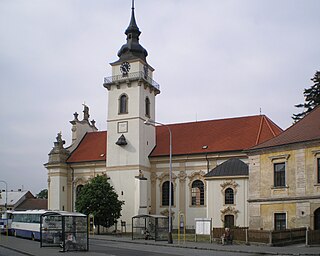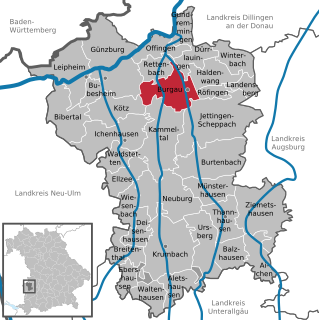
Płock is a city on the Vistula river in central Poland. It is located in the Masovian Voivodeship, having previously been the capital of the Płock Voivodeship (1975–1998). According to the data provided by GUS on 31 December 2018 there were 120,000 inhabitants in the city. Its full ceremonial name, according to the preamble to the City Statute, is Stołeczne Książęce Miasto Płock. It is used in ceremonial documents as well as for preserving an old tradition.

Pszczyna is a town in southern Poland with 25,415 inhabitants (2010) within the immediate gmina. There are 33,654 inhabitants within the area of the town and 50,121 in Pszczyna County of which Pszczyna is the capital. The town is in the Silesian Voivodeship. It was a part of Katowice Voivodeship from 1975 until administrative reform in 1998.

Memmingen is a town in Swabia, Bavaria, Germany. It is the economic, educational and administrative centre of the Danube-Iller region. To the west the town is flanked by the Iller, the river that marks the Baden-Württemberg border. To the north, east and south the town is surrounded by the district of Unterallgäu.

Medzhybizh, previously known as Mezhybozhe, population 1731, is a town in the Khmelnytskyi Oblast (province) of western Ukraine. It is located in the Letychiv Raion (district), 25 kilometres from Khmelnytskyi on the main highway between Khmelnytskyi and Vinnytsia at the confluence of the Southern Buh and Buzhok rivers. Medzhybizh was once a prominent town in the former Podolia Province. Its name is derived from "mezhbuzhye", which means "between the Buzhenka Rivers". It is known as the birthplace of the Jewish Hasidic mystical religious movement.

Heřmanův Městec is a town in Pardubice Region of the Czech Republic. Located at the northern foothills of the Iron Mountains at an altitude of 275 meters above sea level. In 2017, it has about 4,800 residents.

Sarona was a German Templer colony established in Ottoman Palestine in 1871. Sarona is now a neighborhood of Tel Aviv, Israel. It was one of the earliest modern villages established by Europeans in Ottoman Palestine. In July 1941, the British Mandate authorities deported 188 residents of Sarona, who were considered hard-core Nazi sympathizers. By the 2000s, the area had fallen into disrepair and was a haven for drug addicts. However, since 2003, the area has undergone massive renovation, which involved moving and relocating historical buildings before their restoration. The area is now a popular shopping district, as well as housing museums, cultural artifacts centering on its history, and IDF complexes.

Biržai is a city in northern Lithuania. Biržai is famous for its reconstructed Biržai Castle manor, and the whole region is renowned for its many traditional-recipe beer breweries.

Rees is a town in the district of Cleves in the state of North Rhine-Westphalia, Germany. It is located on the right bank of the Rhine, approximately 20 km east of Cleves. The population in 2005 was 22,559. Founded in 1228, Rees is the oldest town in the lower Rhine area.

Ochtrup is a town in the district of Steinfurt, in North Rhine-Westphalia, Germany. It is situated approximately 20 km west of Rheine and 20 km east of Enschede.

Burgau is a town in the district of Günzburg in Swabia, Bavaria. Burgau lies on the river Mindel, and has a population of just under 10,000.

Ichenhausen is a town in the district of Günzburg, in Bavaria, Germany. It is situated on the river Günz, 9 km south of Günzburg.

The Remah Synagogue,, is named after Rabbi Moses Isserles c.1525–1572, known by the Hebrew acronym ReMA who's famed for writing a collection of commentaries and additions that complement Rabbi Yosef Karo's Shulchan Aruch, with Ashkenazi traditions and customs. Remah Synagogue is the smallest of all historic synagogues of the Kazimierz district of Kraków. It is currently one of two active synagogues in the city.

Müller Milk & Ingredients, formerly Robert Wiseman Dairies and later Müller Wiseman Dairies, is the largest milk supplier and distributor in Great Britain. It is part of the Müller UK & Ireland Group that is owned by the German Müller family.

Kleinheubach is a market community in the Miltenberg district in the Regierungsbezirk of Lower Franconia (Unterfranken) in Bavaria, Germany and the seat of the like-named Verwaltungsgemeinschaft. It has a population of around 3,600.

Hainsfarth is a municipality in the district of Donau-Ries in Bavaria in Germany.

Kraków District (German: Distrikt Krakau, Polish: Dystrykt krakowski) was one of the original 4 administrative districts set up by the Nazis after the German occupation of Poland during the years of 1939-1945. This district, along with the other three districts, formed the General Government. It was established on October 12, 1939 by Adolf Hitler, with the capital in occupied Kraków – the historic residence of Polish royalty. The Nazi Gauleiter Hans Frank became the Governor-General of the entire territory of General Government. He made his residence in Kraków at the heavily guarded Wawel castle. Frank was the former legal counsel to the Nazi Party.

The Holocaust tourism is a term used by the media in relation to round-trip travel to destinations connected with the extermination of Jews during the Holocaust in World War II, including visits to sites of Jewish martyrology such as former Nazi death camps and concentration camps turned into state museums. It belongs to a category of the so-called 'roots tourism' usually across parts of Central Europe, or more generally, the Western-style dark tourism to sites of death and disaster.

The Jewish Museum of Rome is situated in the basement of the Great Synagogue of Rome and offers both information on the Jewish presence in Rome since the second century BCE and a large collection of works of art produced by the Jewish community. A visit to the museum includes a guided tour of the Great Synagogue and of the smaller Spanish Synagogue in the same complex.



























